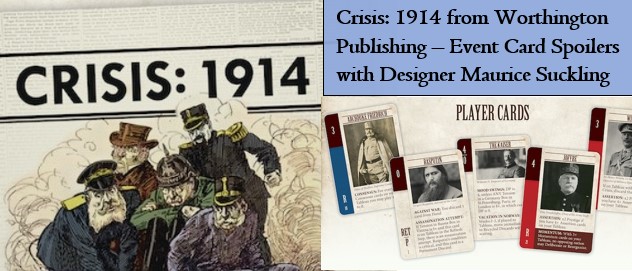We became acquainted with Maurice Suckling with his game Freeman’s Farm 1777 from Worthington Publishing in 2019 and really enjoyed the mechanics and how they all came together to create an interactive and interesting look at the Battle of Saratoga during the American Revolution. Since that time, Maurice has designed several other games that have went on to successful Kickstarter campaigns including Hidden Strike: American Revolution, Chancellorsville 1863 and 1565 Siege of Malta. He is now working on a game that is tied to the buildup of tensions that led to the outbreak of The Great War called Crisis: 1914 from Worthington Publishing, which was successfully funded on Kickstarter this past summer. He has prepared a series of Event Card Spoilers for the game and we are hosting them here on the blog. These posts will share the cards basis in history as well as how they are used in the game.
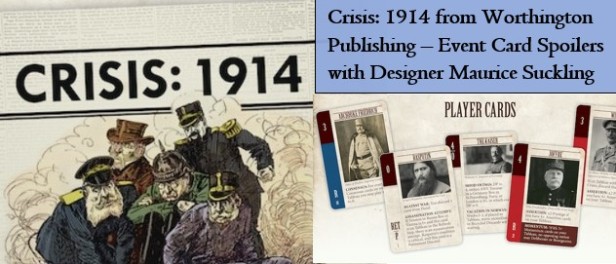
If you are interested in ordering Crisis: 1914, you can pre-order a copy for $65.00 from the Worthington Publishing website at the following link: https://www.worthingtonpublishing.com/collection/crisis-1914-pre-order-this-game-will-not-ship-until-february-2024
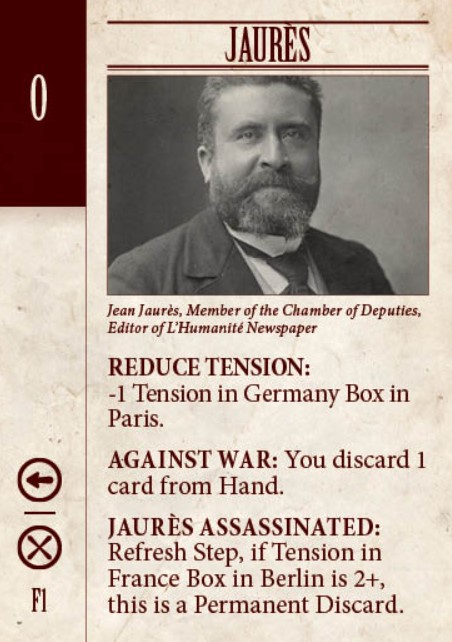
Card #1 – Jean Jaurès – Member of the Chamber of Deputies, Editor of L’Humanité Newspaper
Leader of the French Socialist Party and a staunch pacifist. Jean Jaurès was vehemently opposed to Russian influence upon French foreign policy during the Crisis and used both his position at the L’Humanité Newspaper and involvement with the French Section of the Workers’ International (SFIO) as platforms to advocate for diplomatic restraint (Martel 2014, 281-282, 322, 356). Following his return from a meeting of the International Socialist Union in Brussels – where he joined the German Hugo Haase in condemning a potential war – Jaurès was assassinated on July 31st (Martel 2014, 310).
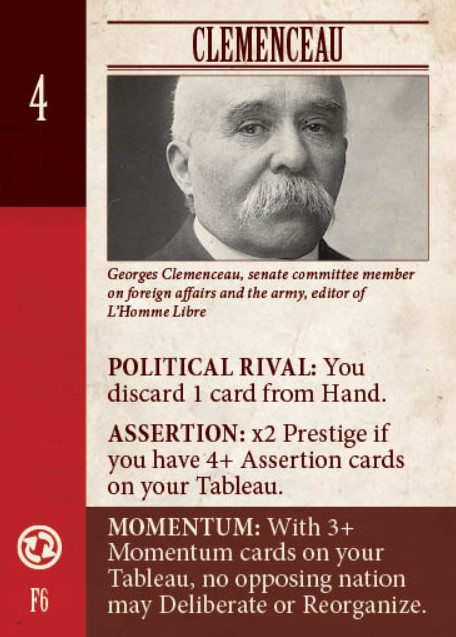
Card #6 – Georges Clemenceau – Senate Committee Member on Foreign Affairs and the Army, Editor of L’Homme Libre
The Prime Minister of France from 1906 to 1909 and a failed presidential candidate in 1913. By the start of the Crisis, Clemenceau had cultivated a longstanding rivalry against Raymond Poincaré, the victor of the aforementioned election, and often openly criticized or outright opposed his endeavors (Clark 2012, 311, 441). Even so, as an Independent Radical, Clemenceau’s conservative tendencies were somewhat more fiscally oriented and he consistently supported the war following its outbreak.
During his tenure as Prime Minister, Clemenceau contributed to the reformation of the French military through increased governmental control (Clark 2012, 217).
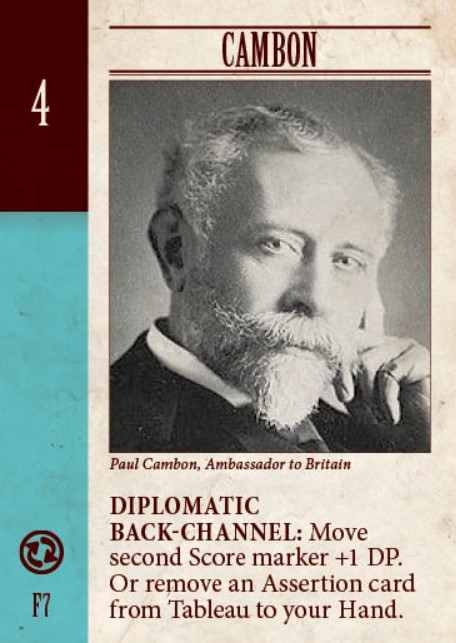
Card #7 – Paul Cambon – Ambassador to Britain
Brother of Jules Cambon, French Ambassador to Germany. Appointed to London in 1898, Cambon never deigned to learn English, but he would nevertheless play a major role in the eventual establishment of the Entente Cordiale (Clark 2012, 192-194). His vigorous support for the Anglo-French Entente continued through 1914, but he found during the crisis that his personal presumption of a steadfast British commitment to France was not always matched in Westminster. As a result, Cambon was forced to try to extract a tangible commitment from Grey at the height of the Crisis – especially between July 28th and August 1st – when Britain appeared least likely to honor its “moral obligation” under the agreement (Clark 2012, 537-542).
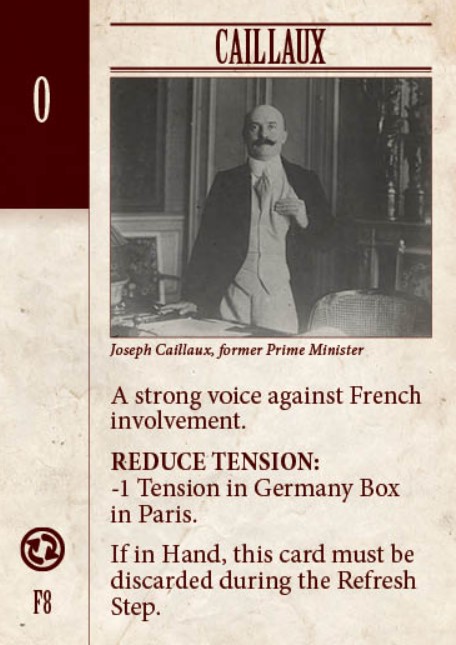
Card #8 Joseph Caillaux – Former Prime Minister
The Prime Minister of France from June 1911 until his resignation in January 1912, Joseph Caillaux had remained a prominent and powerful figure on the contemporary political scene. Monsieur Caillaux boasted significant experience gained during his repeated tenures as Minister of Finance and, as a result, continued to exert influence through his advocacy for left-leaning financial policies and reforms in the wake of his ministry. However, any impact he might have had during the July Crisis was cut short well in advance: In March 1914, his wife, Madame Henriette Caillaux, murdered the editor of the conservative newspaper Le Figaro (Otte 2014, 131; Martel 2014, 135, 160, 210). The spectacle of the ensuing trial embroiled not only Joseph, but also much of the French public for a nine-day period at the height of the Crisis.
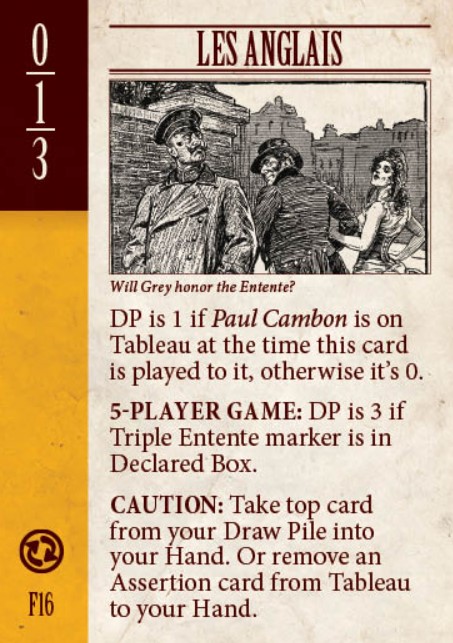
Card #16 Les Anglais – Will Grey honor the Entente?
The eventual solidification of the Triple Entente was far from a foregone conclusion at the start of the July Crisis. Indeed, the Entente Cordiale between France and Britain was only ever formulated as a non-binding agreement – and thus more ambiguous by nature than a more formalized defensive alliance. Although Grey had previously made repeated promises of support to Paul Cambon in private, promises that he himself understood to be indicative of a “moral obligation” under international law, he nevertheless retained and leveraged the freedom to downplay Britain’s commitments to his peers and the broader public (Clark 2012, 213-214; Otte 2014, 493).
It was as a result of this discrepancy – between Cambon’s presumption of British support and Britain’s perception of the agreement’s flexibility – that Germany sought to ensure British neutrality in the event of war: From Berlin, it seemed a viable option and a real possibility until the very last moment.
If you missed the previous entries in the series, you can catch up on the posts to date by following the below links:
Series Introduction and General Mobilization Cards
If you are interested, we posted an interview with the designer and you can read that at the following link: https://theplayersaid.com/2023/07/12/interview-with-maurice-suckling-designer-of-crisis-1914-from-worthington-publishing-currently-on-kickstarter/
-Grant
